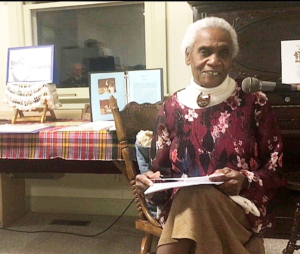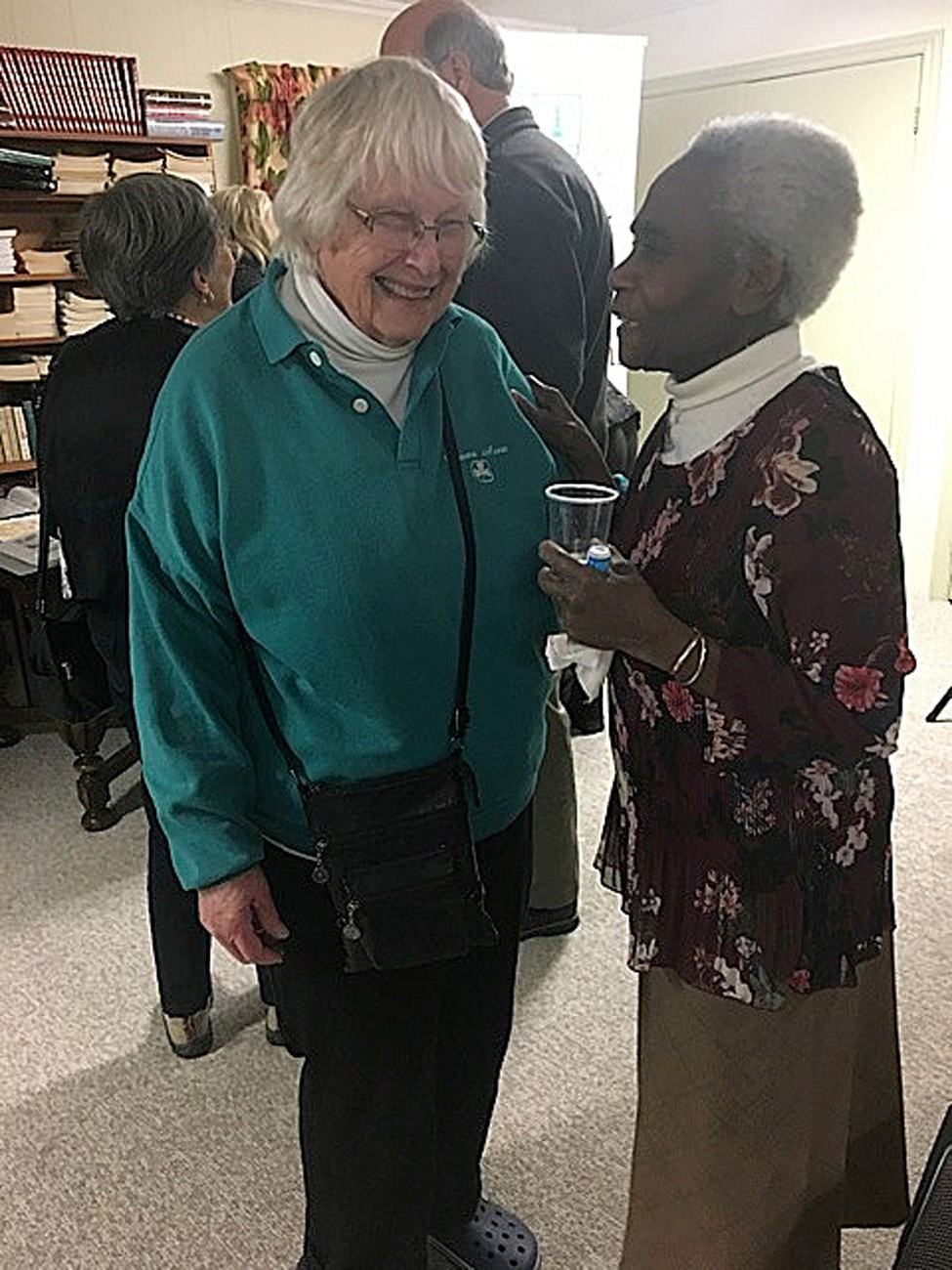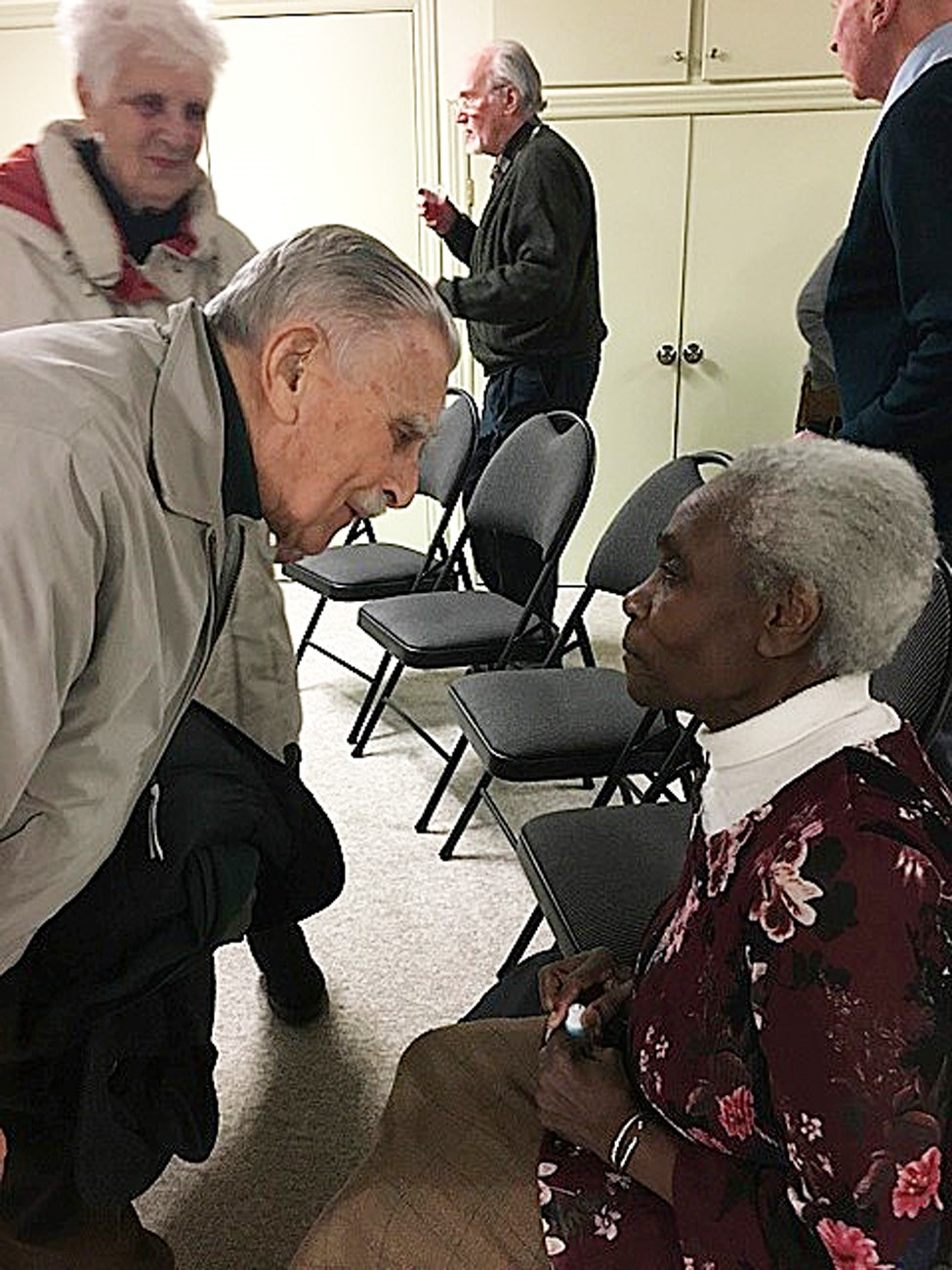Life in Jamaica and Canada
Presentation by Nyamme (Nye) Samuels. Article by Marguerite Rogers, photos by Chanda Samuels. February, 2019.
Flanked by tables displaying photos, scrapbooks and some beautiful prize-winning handwork, Nyamme Samuels, with her hand-quilted bag carrying a small back-supporting cushion, settled comfortably in a chair for what was very much like a fireside chat.

Born in Jamaica in 1926, Nye was the eldest of a family which would eventually number six; Nye, her brother, two sisters and two half-sisters. The older two sisters died when they were young. Her name, Nyamme, originates in Africa and means, one who knows and sees everything. She pronounces it ‘NY-am-ee’. In Jamaica they pronounced it ‘NE-am-ee’ which is "not a good word". So from an early age she was known as Nye. Her great grandfather was descended from the Mandinka people and her great grandmother was from another group. The mixing of tribes was not looked upon with great favour at that time. 1926 was in an historic era. In Jamaica,
1926 to 1944 were years of a rising of national consciousness. A Revolution in 1938 brought the emergence of a distinct culture. Ties with Africa were strengthened, and modern economics used Europe as a model. (Africans were considered as savages.) Leaders of the Revolution were hanged and others were jailed. Fraternal Associations sprang up. Education was not viewed as being very necessary in the 1920s and 30s. Beyond elementary school was not widely available and it was not free.
Nye left school at the age of 16. She enrolled in College at St. George's School for Boys. It was a day school for boys and then used as a College in the evenings. Nye studied physics, chemistry and biology and qualified as a Pharmacist at the age of 22. It was at College that she met Eric who was to be her future husband. Nye worked in Jamaica as a pharmacist for 12 years, dealing mainly with narcotics. Eric in the meantime earned a scholarship to McGill where he completed an MSc. From there he went to Saskatoon to complete a PhD in Bio Chemistry. In 1960 Nye joined him in Saskatchewan, about which she knew virtually nothing, except that it is the "breadbasket of Canada". On the way she visited a friend in New York who asked "Are you crazy?". With degrees in hand, the young couple moved to Ottawa in 1963 and to Osgoode in 1971.
In Ottawa Nye did contract work for the government and also for private companies. They both became involved in the Jamaican Community as volunteers. Eric was a cricket player and was dismayed that black players were not welcome at the cricket club headquartered at Rideau Hall. He appealed to the Governor General who declared that if everyone was not to be included, then no one could play at Rideau Hall. The Caribbean Community was included and the club grew. Recently, Nye accepted an award for Eric, posthumously, as a Cricket Builder in the National Capital.
When they moved out here, Nye became deeply involved in our community. The Women's Institute, 4H, Girl Guides and a church choir all benefitted from her leadership skills. With the WI she became a Department of Agriculture course leader. She prepared a brief about Women in Rural Areas, and led a delegation to present it to the Provincial government.
She conducted a Citizenship course in Kars in 1984 and organized a court at the middle school for the participants. One of those receiving citizenship was Anne Hackston, whose husband Dave was present for Nye's talk. She was an advisor to the Ontario Department of Education on race relations and also to the Ottawa Carleton Board. We learned that Nye's half-sisters are both involved in Development Education and Action. One was recently awarded the Order of Distinction, for her work in Human Rights.
 Nye told us that there were good times and difficult times with her life in Ottawa. One of the best, and the highlight of her volunteer work with Guides, was being selected as a delegate to the Ontario Provincial annual meeting for Guiders, in Hamilton, at McMaster University. During a break in the sessions, Nye stepped out into a courtyard where about 10 Guiders were sitting under a tree singing with a group from an Anglican Church conference which was meeting at the same time. She joined them. The tree reminded her of the sycamore tree in the bible where someone climbed to get a better view. The group sang the Song of Peace, which tells about hopes and dreams, and reminds us that sunlight beams on all lands. Nye sang this for us in her clear, strong, soprano voice. We were all deeply moved.
Nye told us that there were good times and difficult times with her life in Ottawa. One of the best, and the highlight of her volunteer work with Guides, was being selected as a delegate to the Ontario Provincial annual meeting for Guiders, in Hamilton, at McMaster University. During a break in the sessions, Nye stepped out into a courtyard where about 10 Guiders were sitting under a tree singing with a group from an Anglican Church conference which was meeting at the same time. She joined them. The tree reminded her of the sycamore tree in the bible where someone climbed to get a better view. The group sang the Song of Peace, which tells about hopes and dreams, and reminds us that sunlight beams on all lands. Nye sang this for us in her clear, strong, soprano voice. We were all deeply moved.Nye concluded by saying that she has had so many years on earth and has so many stories to tell. She is working on a book of these stories, which we eagerly look forward to.


